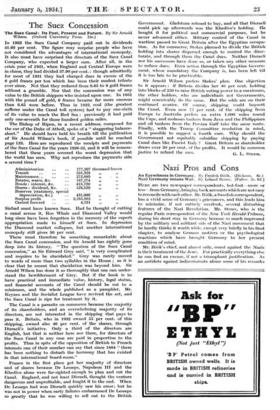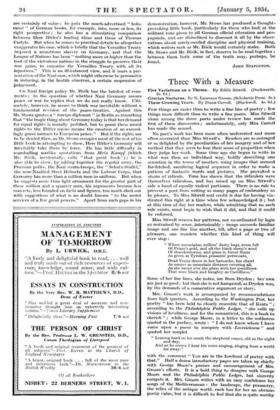Nazi Pros and Cons
HERE are two newspaper correspondents, hot-foot—more or less—from Germany, bringing back accounts which are not easy to reconcile with each other. Mr. Book, a Swedish correspondent, has a vivid sense of Germany's grievances, and this leads him to minimize, if not entirely overlook, several disturbing features of the Nazi Revolution. Mr. Stowe, who is the regular Paris correspondent of the New York Herald-Tribune, during his short stay in Germany became so much impressed by the military and militant side of the Nazi movement that he hardly thinks it worth while, except very briefly in his final chapter, to analyse German motives or the psychological reactions which have brought Germany to her present conditiOn of mind.
Mr..I3ook's chief, and almost only, count against the Nazis is their treatment of the Jews. For practically everything else he can find an excuse, if not a triumphant justification. As an antidote against indiscriminate abuse some of his remarks are certainly of value ; he puts the much-advertised " holo- caust " of German books, for example, into, more or less, its right perspective ; he also has a stimulating comparison between Herr Hitler's leading ideas and those of Thomas Carlyle. But when he comes to practical details he altogether exaggerates his case, which is briefly that the Versailles Treaty imposed a monstrous slavery on Germany, and that the- League of Nations has been " nothing more or higher than the tool of the victorious nations in the struggle to preserve their war gains, to canonize the Versailles Treaty with all its injustices." -This is an ill-balanced view, and it mars a pre- sent at ion of the Nazi case, which might otherwise be persuasive in inducing, in the hostile observer, a certain suspension of judgement.
Cn Nazi foreign policy Mr. Book has the briefest of com- ments; to' the question of whether Nazi Germany means peace or war he replies that we do not really know. Ulti- mately, however, he seems to think war inevitable without a fundamental revision of the peace-treaties. Against this Mr. Stowe quotes a" foreign diplomat " in Berlin as remarking that "the tragic thing about Germanytoday is that her demand for equal rights is morally justified, but to grant these moral rights to the Hitler 're'gime means the creation of an exceed- ingly grave menace to European peace." But if the rights are to be denied then, as Mr. Stowe occupies most of thereat of his little book in attempting to show, Herr Hitler's Germany will inevitably take them by force. He has little difficulty in marshalling warlike quotations from Mein Kampf (which Mr. BUM, incidentally, calls "that great book") ; he is also able to show, by adding together the regular army, the Prussian police, the Nazi storm-troops,_ the " Schutz-Staffel," the now-Nazified Steel Helmets and the Labour Corps, that Germany has more than a million Men in uniform. But when he suggests more than light armament for the greater part of these million and a quarter men, his arguments become less concrete, less founded on facts and figures, too much eked out with suggestions of what is no doubt known "to the secret services of a few great powers." Apart from such gaps in his demonstration, however, Mr. Stowe has produced a thought- provoking little book, particularly for those who look at the Militant tone given to all German official education and pro- paganda, and are disinclined to discount it all by the obser- vations about sorely-needed discipline and physical training, which writers such as Mr. Book would certainly make. Both Mr. Stowe and Mr. Book, in fact, deserve to be read together ; between them both some of the truth may, perhaps, be found.
JOHN STAPLETON.







































 Previous page
Previous page